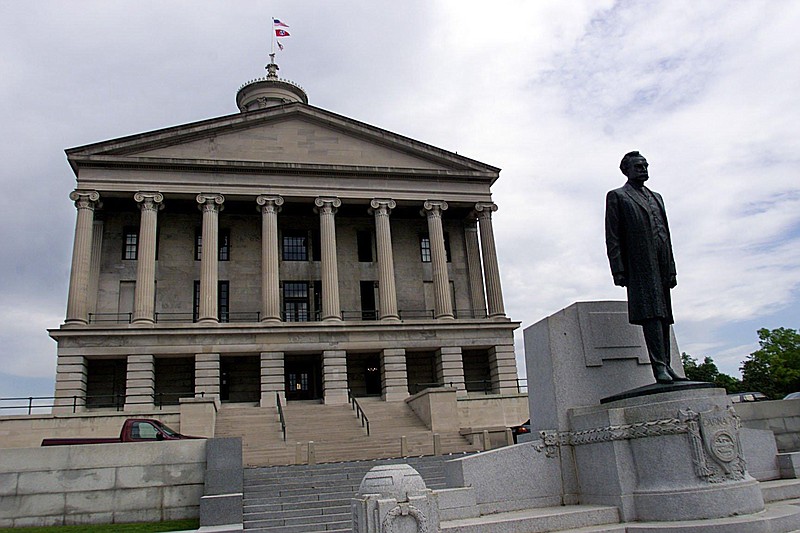NASHVILLE, Tenn. (AP) - Tennessee lawmakers on Wednesday adjourned their annual legislative session. Here's a look at the top bills that the GOP-controlled General Assembly passed over the past five months.
___
Budget: Tennessee lawmakers advanced a $42.6 billion spending plan for the upcoming year, which includes a one-week sales tax holiday on restaurants, bars and groceries, an infusion of cash into capital maintenance and improvements, and a big paydown into the state's retirement system. Big ticket items range from $931 million for capital maintenance and improvements, $250 million one-time payment into the state's legacy pension plan and $250 million into a new mental health trust fund for K-12 students that will fund projects off of investment returns.
___
Guns: With Gov. Lee's approval earlier this year, Tennessee became the latest state to soon allow most adults 21 and older to carry handguns - either openly or concealed - without first clearing a background check and training. The measure applies to handguns that are concealed and ones that are openly carried, but it does not apply to long guns. The law will take effect July 1. People would still need to clear a federal background check if buying a handgun from federally licensed dealers.
___
Transgender Proposals: The GOP-controlled General Assembly passed several bills related to transgender students this year. One bill would require businesses or government facilities open to the public to post a sign if they let transgender people use multi-person bathrooms, locker rooms or changing rooms associated with their gender identity. The Human Rights Campaign, which opposes the proposed requirement, says it would be the first of its kind. The governor has not yet signed the legislation.
However, Lee, a Republican, signed a different proposal this year that bars transgender athletes from playing girls' public high school or middle school sports.
A separate bill about bathrooms would open up schools and districts to lawsuits if they let transgender students or employees use facilities marked for the sex opposite of what's on their birth certificate. Lawmakers have also advanced a bill that seeks to ban gender-affirming medical treatment for trans minors - including the use of puberty blockers and hormone therapy. Neither bill has been signed by Lee.
___
Executions: This legislation would prevent death row inmates with an intellectual disability from being executed, with the intention of addressing a current death row inmate's case. Attorneys for Pervis Payne have argued he is intellectually disabled as they fight to prevent the state from executing him. He received a temporary reprieve from the governor last November due to the COVID-19 pandemic, but that relief has since expired.
___
Police Policies: If this bill is signed, chokeholds would be banned unless an officers believes deadly force is authorized. It also would boost training around using chokeholds, require law enforcement agencies to develop de-escalation polices, as well as develop policies around firing weapons at moving vehicles, and prohibit issuing no-knock warrants. The bill also would prohibit retaliation against officers who report or intervene against excessive use force by other officers.
___
Abortion: Medical providers in Tennessee would be required to cremate or bury fetal remains from surgical abortions under legislation that's headed to Lee's desk. The Republican governor hasn't publicly weighed in on the bill, but he has repeatedly stressed his opposition to abortion. Last year, he signed one of the strictest abortion bans in the country but it was promptly blocked from being implemented by a legal challenge.
___
Unemployment: Tennessee lawmakers spent some of their final moments of the session slashing unemployment compensation from 26 weeks to 12 weeks - making it among the lowest in the country. Additional weeks would be added if the state's average unemployment rate goes above 5.5% for a maximum of 20 weeks should the unemployment rate reach 9%. Supporters argued the move will encourage people to become employed full-time. However, critics warn that the reduction will not help the state's unemployed, particularly those affected by the coronavirus pandemic. However, the benefit cap would go up to $325 per week. It was previously $275 per week. If signed by Lee, it would go into effect in 2023.
___
Critical Race Theory: During the final day of the legislative session, lawmakers signed off on a measure that would restrict teaching about systematic racism in America. A key provision of the bill would ban teaching that individuals, by virtue of race or gender, are inherently racist, sexist or oppressive, whether consciously or unconsciously. Across the country, conservative lawmakers say they fear that white students are being taught that they should be ashamed for past wrongs carried out by earlier generations, such as slavery. But opponents counter that such measures may be unenforceable and a violation of free speech.
___
Constitution Challenges: A last-minute bill would require that lawsuits that challenge the constitutionality of a state law, redistricting or administrative rules would have a slightly new process to move through. If this measure is signed into law, the Tennessee Supreme Court would appoint a three-judge panel - selected from existing trial judges - that will represent West, Middle and East Tennessee. The bill is a watered-down compromise from previous proposals that sought to overhaul and move constitutional legal challenges away from Nashville, which Republicans have accused the judges of leaning too Democratic.
